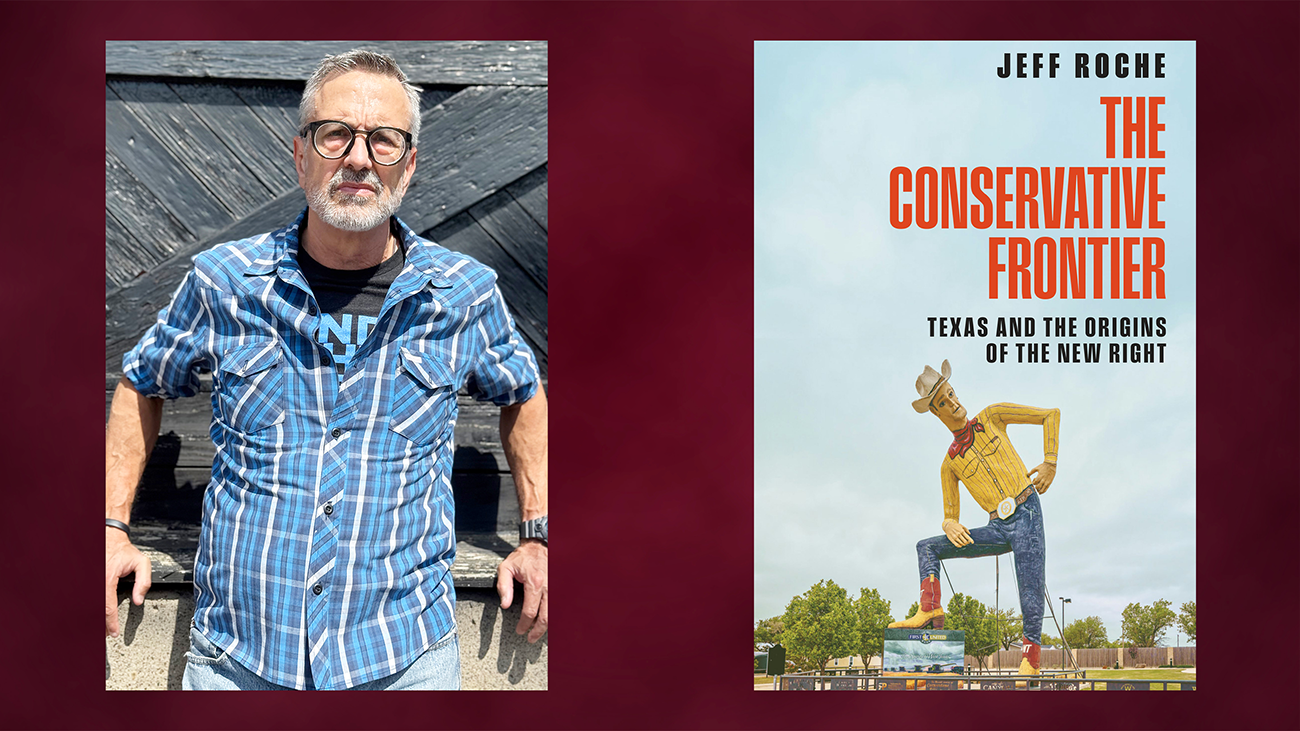- Research
- Featured
- History
- Community
Canyon Graduate to Speak at WT on Modern Conservatism’s Texas Roots
Copy by Chip Chandler, 806-651-2124, cchandler@wtamu.edu
CANYON, Texas — The author of a new book exploring this region’s role in the American conservative political movement will give a special lecture Nov. 5 at West Texas A&M University.
Jeff Roche, a professor of history at the College of Wooster in Ohio who graduated from Canyon High School and attended WT in the early 1980s, will discuss “The Conservative Frontier: Texas and the Origins of the New Right” at 7 p.m. Nov. 5 in the Thunder Room in the Jack B. Kelley Student Center on WT’s Canyon campus.
Admission is free, and a Q&A session will follow.
The event is sponsored by the WT Department of History and the Center for the Study of the American West.
“This is the first book-length study that examines the deep cultural foundations of West Texas's conservative political outlook,” said Dr. Tim Bowman, head of WT’s Department of History. “Jeff’s book covers a lot of ground, so anyone interested in the region’s history since the establishment of the original cattle ranches of the 1870s will find something of interest.”
Roche—whose book has been featured on National Public Radio and in The New York Times, Texas Monthly and elsewhere—argues that modern-day conservatism, or “cowboy conservatism,” found its roots on the Great Plains, as pioneering ranchers settled the area in the late 1800s.
Roche said he wrote his dissertation about 1960s conservative politics in the Panhandle but wasn’t satisfied because, at the time, he couldn’t track down their origins. When he eventually expanded that dissertation into a book, further research pinned the movement’s origins to the ranching culture of the 1880s, he said.
“I feel really lucky that no one else stumbled on this,” Roche said. “If you want to understand conservatism, why don’t you go to the most conservative place in the country?”
Roche conducted extensive research in Panhandle-Plains Historical Museum’s archives at WT, as well as other archives around the state. A photo of Canyon’s iconic Tex Randall statue is the cover image on the book, too.
“WT and its history department play a fairly prominent role in the book,” Roche said. “There’s a whole chapter about the origins of the Panhandle-Plains Historical Society and (founder and former WT faculty member) Hattie Anderson’s work as a scholar.”
What’s sometimes lost in nostalgia for the Old West, Roche said, is “that these guys were businessmen and entrepreneurs.”
“The modern equivalent would be Silicon Valley,” he said. “They reinvented an industry, were very much interested in disruption and, like most entrepreneurs, they don’t want a lot of involvement from the state.”
Their raw economic power waned with the arrival of the Dust Bowl, but their influence continued to grow.
“What they feared more than anything else was a population, as they put it then, on the dole,” Roche said. “Once people began to tie New Deal programs to socialism, the die was cast. There’s no place more anticommunist than West Texas.”
Promoting regional research is a key aim of the University’s long-range plan, WT 125: From the Panhandle to the World.
That plan is fueled by the historic One West comprehensive fundraising campaign, which reached its initial $125 million goal 18 months after publicly launching in September 2021. The campaign has raised more than $175 million and will continue through 2025.
About West Texas A&M University
A Regional Research University, West Texas A&M University is redefining excellence in Canyon, Texas, on a 342-acre residential campus, as well as the Harrington Academic Hall WTAMU Amarillo Center in downtown Amarillo. Established in 1910, the University has been part of The Texas A&M University System since 1990. A Hispanic Serving Institution since 2016, WT boasts an enrollment of more than 9,000 and offers 66 undergraduate degree programs, including eight associate degrees; and 44 graduate degrees, including an integrated bachelor’s and master’s degree, a specialist degree and two doctoral degrees. WT recently earned a Carnegie Foundation classification as a Research College and University. The University also is home to the Panhandle-Plains Historical Museum, the largest history museum in the state and the home of one of the Southwest’s finest art collections. The Buffaloes are a member of the NCAA Division II Lone Star Conference and offers 16 men’s and women’s athletics programs.
—WT—

